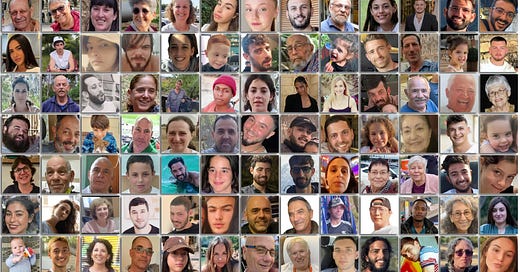Today is April 4, 2024. It has been 180 days since October 7. Six hundred Israeli soldiers have been killed in battle. About 130 people kidnapped from Israel are still held hostage in Gaza. Thirty-four are presumed dead.
The living hostages, left entirely at the mercy of an antisemitic, genocidal, Islamist terrorist organization, are, according to a United Nations report, likely being tortured and sexually abused.
Although the IDF’s extraordinarily low ratio of civilian to combatant casualties is unparalleled, the loss of any civilian life is tragic. In addition to Palestinian casualties, “friendly fire” killed 3 kidnapped Israelis, and now 7 World Central Kitchen workers. Meanwhile, as the IDF try to minimize civilian casualties, Hamas does its best to maximize the number of innocent civilians killed, forcing them to become Hamas “martyrs” for the purpose of anti-Israel PR.
War really is hell.
On Sunday April 7, six months from the deadliest day for the Jewish people since the Holocaust, I will be at Re’im, the site of the Nova Dance Festival, where nearly 400 attendees were killed or kidnapped.
***
I have just over a week left in Israel, after which I will be covering the Ted conference in Vancouver where Bill Ackman and Bari Weiss (among many others) will be speaking. Last year, Coleman Hughes’s Ted Talk, based on his new book, The End of Race Politics: Arguments for a Colorblind America, resulted in a controversy about which I began to write but was still pondering on October 6. After October 7, the announcement of a Ted conversation with Ackman and Weiss created even more controversy. Five Ted Fellows resigned. Stay tuned for news from Ted.
Below are 5 interviews published on Zoe Booth’s Quillette Cetera podcast. The first is with Soviet dissident and refusenik Natan Sharansky. (I highly recommend turning on the subtitles in settings.) We began our conversation about his letters with Alexei Navalny, and moved on to discuss the current war, campus antisemitism, and his resignation from the Israeli cabinet in protest over the 2005 Gaza withdrawal.
Contrast his perspective with that of Dan Shueftan, who still believes that unilaterally withdrawing from Gaza was the right decisions. (Shueftan, who thinks Israel should also pull out of Judea and Samaria/the West Bank, calls himself “the rudest man in Israel,” so watch at your own risk.)
Next on the list is tech entrepreneur Hillel Fuld, who was personally affected by terrorism even before October 7. His brother, Ari, was stabbed by a 17-year-old Palestinian terrorist in 2018. Though gravely injured, Ari chased the terrorist, shooting him just in time to save a woman from being murdered. Ari Fuld (Z”L) did not survive and the teen terrorist was handed a life sentence for murder. (When you hear about “children” in Israeli prisons, this is one example.)
Tasha Cohen found herself volunteering all day every day, doing whatever was needed after October 7. She noticed the structures in place for the well-being of soldiers in the Gaza envelope. So she began bringing people together to care for soldiers in northern Israel. Now she runs a nonprofit called Chayal’s Angels (chayal is Hebrew for “soldier”), which brings wellness support to soldiers operating in the north. (As you may have heard, things on the border with Lebanon are escalating…)
Finally, Michal Colter Wunsh is Israel’s special envoy for the prevention of antisemitism. She has been protested against and heckled on US college campuses, where she’s been met with messages like “Zionists not welcome.” She talks about how the type of antisemitism that fueled the October 7th massacres is the same kind of antisemitism that fuels the pro-Hamas responses to those massacres across the globe.
Natan Sharansky
Dan Shueftan
Hillel Fuld
Tasha Cohen
Michal Cotler Wunsh
Next up in the editing queue: Former IDF international spokesman Jonathan Conricus, now a senior fellow at the Foundation for the Defense of Democracies. Historian Gil Troy on the history of the alliance between the Palestinian Liberation Organization (PLO), a terrorist organization, and the critical social justice left. And also, Israeli journalist Lahav Harkov, who has covered both international and domestic politics, including the Knesset. (Previous video interviews from Israel can be found here.)
Soon I will also begin publishing my interviews with survivors, former hostages, hostage families, and others.
More to come…




